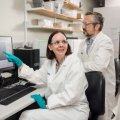Research which aims to increase the profitability and sustainability of the Australian sugarcane industry is one step closer to reality thanks to the work of a UQ-based institute.
Scientists from the the Cooperative Research Centre for Sugar Industry Innovation through Biotechnology (CRC SIIB) are making substantial progress towards improving biotechnology currently used in Australian sugarcane research.
Led by Dr Prakash Lakshmanan and Dr Priya Joyce, the project aims to develop commercially useful biotechnology tools for sugar production and value-added bioproducts, such as bioplastics.
“The latest results from our trials are very promising for one of Australia’s most valuable agricultural commodities,” Dr Lakshmanan said.
“They provide a sound platform from which genetically enhanced sugarcane can be developed for the benefit of our industry and bring us one step closer to commercial release of genetically enhanced canes.”
Dr Lakshmanan said one hurdle to the research was securing investment for further trials to show the new products didn’t pose any health or environmental risks.
Greater access to sugarcane genes – currently being mapped in another CRB SIIB project – would also be key to the project’s success.
The CRC SIIB research team have developed three improved biotechnology methods – two of them involving the popular “gene gun” biolistics system and the other using the soil microorganism Agrobacterium tumefaciens.
These advances have improved the technology and made the process more efficient. Hundreds of independent lines using the new methods have been generated and more than 100 of these are now being tested in the field.
Additionally, the team has generated canes with new characteristics. This is a major advance compared to previous trials of biotech sugarcane plants, where significant variations in important traits were observed.
According to Dr Joyce, the findings from the latest trials are very encouraging.
“The CRC SIIB sugarcane technologies project is laying the foundation for developing commercially useful biotechnology sugarcane, and we are very pleased with the results”, Dr Joyce said.
CRC SIIB research is an integral part of current work being undertaken to strengthen the Australian sugarcane industry, which is estimated to be worth $1.75 billion to the local economy each year.
Media: Julie Lloyd (0415 799 890, JLloyd@bses.org.au) or Cameron Pegg at UQ Communications (07 3365 2049, c.pegg@uq.edu.au)
Cooperative Research Centre for Sugar Industry Innovation through Biotechnology (CRC SIIB)
The Cooperative Research Centre for Sugar Industry Innovation through Biotechnology (CRC SIIB) was established to add new value to Australian sugarcane.
It is a unique alliance of Australia's top sugarcane biotechnology research organisations including four universities, sugar industry research organisations, the Federal and Queensland governments, and commercial expertise.
Established in 2003 under a seven-year joint research agreement, its head office is at The University of Queensland. CRC staff are based in Brisbane and in sugarcane towns throughout Queensland and northern New South Wales. The CRC SIIB entered the commercialisation phase of its research in July 2006.
.jpg)



